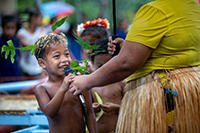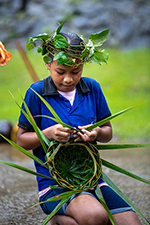Saladak students demonstrate skills learned in preservation of indigenous learning pilot program
- Details
- Category: News
- Published: Thursday, 08 April 2021 05:35
- Written by Bill Jaynes
- Hits: 1908
By Bill Jaynes
The Kaselehlie Press
March 26, 2021
 Saladak, U, Pohnpei—This morning, students of Saladak Elementary School in U, Pohnpei held an event to display what they have learned through an innovative program in cooperation with PREL (Pacific Resources for Education and Learning).
Saladak, U, Pohnpei—This morning, students of Saladak Elementary School in U, Pohnpei held an event to display what they have learned through an innovative program in cooperation with PREL (Pacific Resources for Education and Learning).
The program for preservation of indigenous learning was made possible by a grant to PREL from the organization Nia Tero who used the funding to begin one pilot program in the FSM and one in the Marshall Islands. The kickoff for the pilot program at Saladak Elementary school was held on November 10, 2020. Since then 6th, 7th and 8th graders spent part of each school week receiving instruction on weaving techniques with coconut fronds, carving with machetes, use of some wooden tools that are used traditionally for husking coconuts, splitting and pounding breadfruit, and sakau cups. Students in all grades participated in the program and the learning also included traditional dancing and even canoe carving. Students planted a working garden using traditional techniques, learned all of the traditional names for the plants and maintained the garden. Some student spent time learning the honorific language and traditional titles as well as all of the village names in the U municipality.
“This has been a dream project for me for a long time. After 30 years of trying to get everyone ready for college it became abundantly clear that we also need an educational pathway for those students who just want to live on their Islands and be productive citizens,” wrote Paul Hadik, PREL CEO in an email last November. “I did this years ago in Kosrae and now with the enthusiastic support of Governor Oliver and Director of Ed Etse we are piloting at Saladak Elementary School. Two-Three days a week the local Elders come in and teach everything from weaving, songs and chants, farming and fishing, canoe and navigation, family lineages,  story-telling, local medicine, etc.” he continued.
story-telling, local medicine, etc.” he continued.
Hadik said that the program will last until May at which time PREL will conduct a one-week skills test for the community leaders.
“The goal is to come away soon with an alternative education system that does not eliminate College Prep, but adds another finish line so to speak, for those students and communities (especially on outer islands) who want an education system more relevant to Island life,” he wrote.
On Friday morning, the students gave impressive performances on the campus of Saladak Elementary School. ECE students each told the gathered crowd which clan they each came from. Fourth grade students each gave a specific example of the importance of local foods. Fifth grade students gave the names of each traditional leader in U and their specific titles within the traditional leadership structure. Sixth graders each demonstrated weaving of mwahrmwars, bowls, and baskets from scratch. Seventh graders also demonstrated weaving from scratch using coconut fronds. In their demonstration, they weaved containers for carrying specific food items such as coconut, cooked fish, and breadfruit. The seventh graders also performed two traditional dances. Eighth graders demonstrated their knowledge of the traditional names of the various parts of the traditional canoe, a surprising number of parts. They also demonstrated coconut husking and grating.
breadfruit. The seventh graders also performed two traditional dances. Eighth graders demonstrated their knowledge of the traditional names of the various parts of the traditional canoe, a surprising number of parts. They also demonstrated coconut husking and grating.
The demonstration ended with seventh and eighth graders conducting ahmwadang, a traditional sakau ceremony.
PREL’s representative is Canita Rilometo who has worked with the students since the pilot program’s beginning. Pohnpei Governor Reed Oliver and Department of Education Director Stanley Etse attended Friday’s demonstration.






